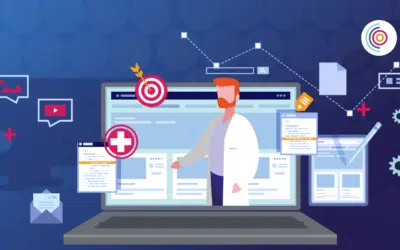The importance of B2B marketing for healthcare companies stands as a linchpin for sustained growth and impactful innovation. In an era where technological advancements and transformative industry trends shape the narrative, healthcare enterprises find themselves navigating a complex ecosystem that extends beyond the traditional boundaries of patient care. Unlike B2C transactions, where the focus is primarily on end consumers, B2B interactions in the healthcare sector involve a multifaceted network of relationships among businesses, stakeholders, and decision-makers.
At the heart of this intricate web lies B2B marketing, a strategic and indispensable facet that facilitates the exchange of knowledge, services, and innovations essential for propelling the industry forward. While patient care remains paramount, healthcare companies must also navigate collaborations with other businesses, healthcare providers, pharmaceutical companies, technology partners, and a myriad of stakeholders to thrive in this competitive landscape.
B2B marketing in healthcare transcends the conventional narrative, becoming a catalyst for progress and transformation. It serves as the conduit through which crucial information is disseminated, partnerships are forged, and cutting-edge solutions are introduced.
This blog post explores the pivotal role played by B2B marketing in the healthcare domain. Through strategic initiatives and a commitment to delivering value, healthcare companies can harness the potential of B2B marketing to foster meaningful collaborations, drive innovation, and ultimately contribute to the overarching goal of delivering high-quality, patient-centric care.
1. Thought Leadership and Content Marketing: Shaping the Narrative
Thought leadership in healthcare entails more than just showcasing expertise; it involves actively shaping the narrative and influencing industry discussions. Healthcare companies that position themselves as thought leaders contribute valuable insights, share industry trends and offer solutions to complex challenges. This proactive approach not only establishes credibility but also fosters trust among stakeholders, including clients, partners, and peers.
By consistently contributing innovative ideas, research findings, and expert opinions, healthcare companies can rise above the noise in a crowded marketplace. Thought leadership allows them to steer conversations, drive industry trends, and position themselves as pioneers in the ever-evolving healthcare landscape.
Complementing thought leadership, content marketing serves as the tangible manifestation of a healthcare company’s expertise and industry influence. From blog posts and whitepapers to webinars and podcasts, content marketing offers a diverse array of channels through which companies can share their knowledge and insights with a wider audience.
In the healthcare sector, where the dissemination of accurate and timely information is crucial, content marketing becomes a cornerstone for engagement. Educational materials, case studies, and research papers not only showcase a company’s depth of knowledge but also provide tangible value to clients and stakeholders. This value-driven approach contributes to building a loyal audience base that sees the healthcare company not just as a service provider but as a trusted source of information.
Content marketing is not limited to disseminating information; it’s about creating a narrative that resonates with the target audience. Compelling storytelling, backed by data and expertise, allows healthcare companies to connect with their audience on a deeper level, fostering a sense of community and loyalty.
The synergy between thought leadership and content marketing is where the magic happens for healthcare companies. Thought leadership shapes the overarching narrative, setting the tone for industry discussions, while content marketing provides the tangible assets that reinforce this narrative.
A well-executed thought leadership strategy informs the content marketing approach, guiding the creation of materials that align with the company’s vision and expertise. Conversely, content marketing acts as the vehicle through which thought leadership is disseminated, reaching a broader audience and solidifying the company’s position as an industry authority.
This symbiotic relationship allows healthcare companies to not only share their knowledge but to actively contribute to the advancement of the industry. Whether through thought-provoking articles, in-depth research publications, or engaging multimedia content, the combination of thought leadership and content marketing becomes a powerful force that propels healthcare companies to the forefront of innovation and influence in the healthcare sector.
2) Building Trust and Shaping Perception through Media and Public Relations
Another vital tool in the B2B healthcare marketer’s bag is media and public relations. Media relations serve as a powerful tool through which B2B healthcare companies can communicate their narratives to a broader audience. Cultivating relationships with journalists and media outlets enables healthcare companies to share their successes, innovations, and thought leadership with the world.
Positive media coverage not only enhances brand visibility but also contributes to building trust among potential clients and partners. Well-crafted press releases, expert interviews, and feature articles showcase a company’s achievements, highlighting its commitment to excellence and innovation. The trust garnered through media relations is invaluable in an industry where credibility and reliability are pivotal factors influencing business decisions.
Public relations, on the other hand, is a strategic endeavor that goes beyond media interactions. It encompasses a broader set of activities aimed at shaping and managing perceptions among various stakeholders, including clients, investors, and the general public.
Effective public relations strategies involve not only disseminating positive news but also proactively managing and mitigating crises. In the healthcare sector, where sensitivity to public perception is heightened, PR efforts play a crucial role in navigating potential challenges, ensuring transparency, and maintaining a positive image even in times of adversity.
By engaging in community outreach programs, participating in philanthropic endeavors, and communicating corporate social responsibility initiatives, healthcare companies can build a positive brand image. This positive perception, carefully cultivated through strategic PR efforts, contributes to the overall success and sustainability of the business.
3) Streamlining Workflows and Centralizing Data With a CRM Tool Like HubSpot
One of the fundamental challenges faced by B2B healthcare marketers is managing a vast array of data and interactions. HubSpot and CRMs serve as a centralized hub, allowing healthcare companies to streamline workflows and consolidate crucial data. From managing B2B leads and contacts to tracking interactions and campaigns, these platforms enable marketers to have a comprehensive view of their engagement strategies.
In the healthcare industry, where relationship-building is paramount, having a centralized CRM ensures that every touchpoint with a client or partner is seamlessly recorded. This not only facilitates efficient communication but also enables marketers to tailor their engagements based on the unique needs and preferences of their audience.
Personalization is a cornerstone of successful B2B marketing, and HubSpot, along with advanced CRMs, empowers healthcare companies to deliver highly targeted and personalized experiences. By leveraging the rich data stored within the CRM, marketers can tailor their messaging, content, and campaigns to resonate with the specific challenges and interests of healthcare professionals, organizations, and stakeholders.
For instance, HubSpot’s marketing automation features enable the creation of personalized email campaigns to important decision makers, lead nurturing workflows, and dynamic content that adapts to the recipient’s behavior. In the healthcare sector, where decision-making is often intricate and highly specific, personalization enhances the relevance of marketing efforts, fostering stronger connections with potential clients and partners.
Collaboration among different departments is crucial for success in B2B healthcare marketing. HubSpot and CRMs break down silos by providing a unified platform where marketing, sales, and customer service teams can seamlessly collaborate. This integrated approach ensures that everyone is working with the same set of data, allowing for more informed decision-making and cohesive strategies.
Efficient communication is particularly vital in the healthcare industry, where precision and accuracy are non-negotiable. HubSpot’s CRM, for example, allows teams to share real-time updates, track communication history, and collaborate on strategic initiatives. This streamlined communication not only enhances internal efficiency but also contributes to a unified and coordinated approach in external engagements.
In the data-driven landscape of B2B healthcare marketing, the ability to measure and analyze campaign performance is critical. HubSpot and CRMs provide robust analytics and reporting features that empower healthcare companies to track the success of their marketing efforts comprehensively.
From monitoring lead acquisition and conversion rates to analyzing engagement metrics and campaign ROI, these platforms offer insights that guide data-driven decision-making. In the healthcare sector, where regulatory compliance and accountability are paramount, having a clear understanding of campaign performance allows marketers to optimize strategies, allocate resources efficiently, and demonstrate the tangible impact of their efforts.
Conclusion
As healthcare companies strive to amplify their impact, build credibility, and foster meaningful relationships, these integrated strategies offer a roadmap for sustained growth. To embark on this transformative journey, consider reaching out to Conway Marketing Group—an industry-leading partner poised to guide your healthcare company through the intricacies of content marketing, media relations, and CRM implementation. With a proven track record of empowering healthcare businesses, Conway Marketing Group is ready to tailor solutions that align with your unique objectives, ensuring your B2B marketing initiatives not only thrive but also set new standards in the dynamic healthcare ecosystem. Contact us today to unlock the full potential of your marketing efforts and steer your company toward unprecedented success.



